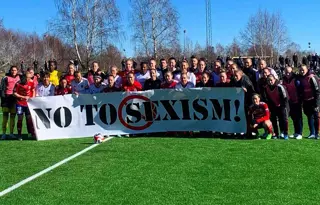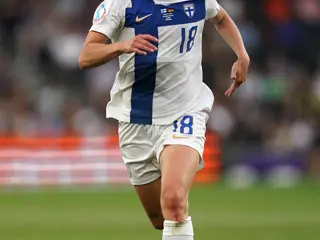Player Story
Linda Sallstrom: "Misogynistic slurs and degrading language – have we not come further than this?"

Linda Sallstrom has made over 130 international appearances for Finland and has played club football in Sweden, Finland and France. Though she began her career in 2007, it was only this year – on 9 March 2024 – that the 35-year-old says she experienced the worst level of spectator abuse in her career. The Vittsjo GIK striker shares her concerns with FIFPRO.
By Linda Sallstrom
It happened during a match in the Swedish Cup. We were playing at IFK Goteborg, who play two divisions below us. There were around 200 people in the stand. And then a group of 10 people started screaming profanities, misogynistic slurs. There wasn't anything in particular that caused it; it wasn’t a dirty game or so. It simply started and kept going and going.
And I did not accept this.
I became very upset because I can't understand what people are thinking when they come to a women’s game, act like this and use this language. You could hear it echo through the whole stadium. Everybody could hear it.
These slurs were aimed directly to my team-mates. They were saying real bad things. Some of the players aren't 18-years-old yet. So, basically, these people were screaming at children.
I'm also not sure how many kids were present in the stands, but they shouldn't have to listen to those people either.
I became upset when it didn't stop. I asked the referee: “Do you hear what they're screaming? Is there anything you can do about it?” She said she couldn’t, but that she was going to write a report afterwards.
It was also strange that no-one from the home team’s leadership or security could remove these people. How could they let this go on for the whole game?
Because the referee wasn’t going to do anything about it, I felt that I could not just stop playing and walk off the pitch. It shouldn't be up to me as an individual player to take action during a game. I am there to play football – and I should be doing just that.
Immediately after the final whistle, I was fuming. I am usually calm and composed. I don't get angry easily; it takes a lot to make me that angry. I went up to confront these people to tell them that I do not accept this kind of behaviour. It was impossible to talk with them, they were just screaming and shouting. I tried until one of my team-mates came and dragged me away.
I had never experienced this kind of behaviour before. I wrote about it on social media and it became a big deal here in Sweden and in Finland too. All the big newspapers wrote about it. I received more than a hundred messages from people showing support, saying they were also tired of this behaviour. It started a big debate.
I turned to social media because I just felt so sad and disappointed. The day before was International Women’s Day, when we talked about women’s rights and how far equality has come. The next day I go to my workplace and have to listen to misogynistic slurs and degrading language. Haven’t we come further than this?
Many reactions to my post were very positive and supportive, but of course there were also people who did not agree with me, writing more profanities, saying I was overreacting, that I was a cry-baby, that men’s players have to deal with this every day, and that we should get used to it.
Others argued that if we want more supporters at the game, then we should just accept this. I don't agree with that because I truly believe it is possible to support your team without using offensive language. And if you can't behave, then you have to be removed from the stadium. You have to go home, learn how to behave and after that you can come back.
We've discussed it with the players and our takeaway message is that you would not go to another person's workplace and use this kind of language. So, why should it be okay to use it at our workplace?
I don't get the logic behind it. How would it help me perform better if my supporters are using language that degrades women? If you really are a supporter, do things that actually help your players on the pitch.
You would not go to another person's workplace and use this kind of language, so why should it be okay to use it at our workplace?
I received support from the Team Human Rights, which is a group of athletes organised by the Finnish Human Rights Association, who are interested in society and human rights questions.
I am one of these athletes and we're doing campaigns every now and then, using our voices and our platforms as athletes. For me, their support meant so much to know that I am not the only one who has these thoughts. It is very important to give players support and to listen to what they have to say.
Many people called me brave, but I don't. The majority of people would have done the same and said something.
Immediately after what happened in Gothenburg, our club said that they are supporting us 100 percent and organised before our home match against FC Rosengard a banner saying No To Sexism.
Both teams and clubs wanted to take a stand. We all felt it was important to take a stand.

I am a little bit worried, and I think it's important to immediately take a stand against this behaviour before it becomes the norm, because it will be more difficult to extinguish it than to stop it from the beginning. There are more big men's clubs investing in their women's team, which also brings a lot of those supporters to the women's game, with the risk of including those who aren't behaving.
It's important to immediately put our feet down and say: 'This kind of behaviour is not accepted here’. These games should be a safe place for the players and everybody in the stands. Families and children should be able to come and not have to listen to this kind of language.
I hope I don't sound too naive. I want to believe that it is possible to have a big crowd and people behaving. My message is not that I want people to sit quietly in the stands, not at all. Showing emotion when in the stands and creating an atmosphere is what we love about football. But we cannot tolerate screaming profanities and misogynistic slurs.



